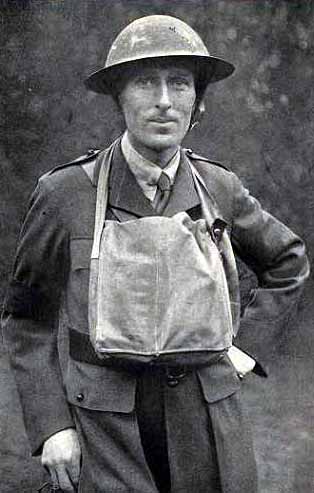Trench Foot and The Devil’s Trap.
‘We’re All Fools. Let’s All Go Home.’
Special to The Great War Project
(14-16 December) On the Western Front, according to British war correspondent Philip Gibbs, conditions are appalling.
“Our men were never dry,” he writes. “They were wet in their trenches and wet in their dugouts. They slept in soaking clothes, with boots full of water, and they drank rain with their tea, and ate mud with their ‘bully’ [corned beef].”
“A particular source of agony that winter,” reports historian Martin Gilbert, “adding to the torment of lice and rats, was trench foot.”
Gibbs describes it this way: “Men standing in slime for days and nights in field boots or puttee lost all sense of feeling in their feet. These feet of theirs, so cold and wet, began to swell, and then go ‘dead’ and then suddenly to burn as though touched by red hot pokers.”
“When the ‘reliefs’ went up, scores of men could not walk back from the trenches, but had to crawl, or to be carried pick-a-back by their comrades.”
“I saw hundreds of them,” Gibbs reports, “and as the winter dragged on, thousands.”
Initially Gibbs’s reports are heavily censored, deemed too shocking by British censors.
“During November,” Gibbs reports, “the rain was so intense that many trenches were knee high, and even waist high in water…In one sector of the front, reckless because of their discomfort, the Germans crawled upon their slimy parapets and sat on top to dry their legs and shouted, ‘Don’t shoot! Don’t shoot!’ “
“Our men did not shoot. They, too, sat on the parapets drying their legs, and grinning at the grey ants yonder until these incidents were reported back to GHQ – where good fires were burning under dry roofs – and stringent orders came against fraternization.”
Such orders are not always obeyed. Gibbs relates a story “that was spoken of” throughout the Western Front.
“Above a German parapet appeared a plank on which in big letters was scrawled these words: ‘The English are fools.’ In a few minutes the plank was smashed to splinters by rifle fire. Another plank appeared with the words ‘The French are fools.’”
“Loyalty to our Allies caused the destruction of that board,” Gibbs reports. Then…
A third plank was put up with these words: ‘We’re all fools. Let’s all go home.’
According to Gilbert, “that board was also shot to pieces, but the message caused some laughter, and men repeating it said, ‘There’s a deal of truth in those words. Why should this go on? What’s it all about? Let the old men who made this war come and fight it out among themselves…The fighting men have no real quarrel with each other. We all want to go home, to our wives and our work.’’
But, Gibbs writes, the soldiers find themselves in what he describes as a “devil’s trap.”
“Loyalty to their own side, discipline, with the death penalty behind it, spell words of old tradition, obedience to the laws of war, or to the caste which ruled them…”
“All the moral and spiritual propaganda handed out by pastors, newspapers, generals, staff officers, old men at home, exalted women, female furies, a deep and simple love for England, and Germany, pride of manhood, fear of cowardice…
“A thousand complexities of thought and sentiment prevented men on both sides from breaking the net of fate in which they were entangled, and revolting against that mutual, unceasing massacre, by a rising from the trenches with a shout of:
‘We’re all fools! Let’s all go home!’”



This project is tremendous work by Mike Shuster, casting beneficial light on a past time of conflict, now often forgotten or too simplistically summarized, just as nations and individuals again suggest that large scale war is the first and best option to address complex multi-national problems.